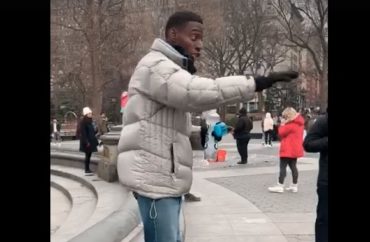
Don’t classify ‘sharing the Gospel under the fighting-words doctrine’
Can a public college get away with violating a student’s First Amendment rights if it promises to change its behavior after facing legal consequences?
A motley collection of advocacy groups is calling on the Supreme Court to resurrect a lawsuit rejected by the 11th U.S. Circuit Court of Appeals, asking it to clean up a three-way split among appeals courts on “nominal damages” for constitutional violations.
The 11th Circuit ruled that Georgia Gwinnett College could not be held accountable for blocking Chike Uzuegbunam (above) from sharing his Christian faith on campus, even in its “speech zones,” because it changed the policies during litigation and he has already graduated.
In friend-of-the-court briefs, religious, secular and First Amendment groups warned that this ruling functionally leaves victims of government abuse without legal recourse.
Another group, meanwhile, argued that the Atlanta-based 11th Circuit had declared Christian preaching unprotected speech.
“If sharing the Gospel falls under the fighting-words doctrine, then it will be ‘open season’ on Christians who preach what Christians have preached for two thousand years and what was preached at the time of the Founding,” the Foundation for Moral Law wrote in its brief.
MORE: The 11th Circuit’s bizarre rejection of government accountability
‘The most outspoken students’ will graduate before their rights are vindicated
The 11th Circuit is already a bad actor among appeals courts by issuing a similar 2017 ruling known as Flanigan, the American Humanist Association told the justices. Both Flanigan and Uzuegbunam were decided en banc, with the full court blessing government abuse, the brief says.
Whereas Flanigan involved an unconstitutional ordinance that was not enforced against the plaintiff, the appeals court “now holds that a victim of a past constitutional violation is remediless even when the challenged policy has been enforced against the plaintiff before its repeal,” the secular group argues.
The brief calls the Georgia Gwinnett case “an ideal vehicle for resolving the longstanding circuit conflict over whether nominal damages can ever be deemed equitable relief beyond the mootness context.” The 9th Circuit recently ruled to include nominal damages as equitable relief under the Americans with Disability Act of 1990, the humanists wrote.
“If standalone nominal-damages claims are mooted just as easily as claims for equitable relief, students will be left with little incentive to challenge unlawful speech codes in court,” the Foundation for Individual Rights in Education wrote in its brief.
MORE: Court lets college off the hook for punishing student for sharing his faith
“Student speech rights will become devalued and colleges and universities will be emboldened to expand their speech restrictions,” the civil liberties group said.
Nominal damages are the best remedy for students whose constitutional rights have been violated by their colleges, considering that they remedy past infringements, FIRE argued.
It’s easy for colleges to moot claims for declaratory or injunctive relief, and “because suppression of speech typically does not inflict financial injuries” (perhaps “the cost of gas to drive to a designated free speech zone”), “students rarely have viable claims for compensatory damages,” FIRE argued.
The median resolution time for a civil case in federal court is 11-28 months, and since “the most outspoken and politically active students tend to be juniors and seniors,” they are likely to graduate before they can “secure redress,” the brief says. Thus, colleges can take advantage and prolong a case until the student has graduated.
Public institutions of higher education already get preferential treatment under federal case law, FIRE notes: Courts apply “a rebuttable presumption that the objectionable behavior will not recur” when governmental defendants “voluntarily” change a policy, as did Georgia Gwinnett.
‘Access to the courtroom is vital for religious minorities’
“The ability of individuals to vindicate” their constitutional rights should not depend on their location, according to a brief by the Religious Freedom Institute’s Islam & Religious Freedom Action Team. “The lack of a uniform rule also undermines a larger societal interest in deterring violations of constitutional rights and ensuring compensation for past violations.”
It called the mootness exception “a prudential doctrine” intended to help courts make “difficult determinations” about the length of litigation and past and future harm to plaintiffs.
“A rule that nominal damages save a constitutional claim from mootness will provide certainty to litigants, is straightforward for courts to administer, and recognizes the importance of vindicating constitutional rights,” the group said. It cited English common law, which issued a nominal sum of money to a person for an abstract, instead of physical, injury.
The principle goes all the way back to the Supreme Court decision that enshrined judicial review, the brief argued. The majority opinion in Marbury v. Madison concluded that “where there is a legal right, there is also a legal remedy… whenever the right is invaded.”
MORE: Evangelical student’s speech judged ‘disorderly conduct’
The Jewish Coalition for Religious Liberty cited 1978’s Carey ruling, which said nominal damages “vindicate[] deprivations of certain ‘absolute’ rights” whose “importance to organized society” is undeniable.
Considering the upward trend of speech restrictions on college campuses, the 11th Circuit’s denial will only leave students on campus more vulnerable, the coalition wrote in its brief. It also said government defendants have used “voluntary cessation” to exploit religious minorities by mooting their claims in court.
What is ultimately on the line “is the ability of religious adherents subject to discriminatory policies to get their day in court and be heard,” the coalition said:
Access to the courtroom is vital for religious minorities whose practices are often unknown or misunderstood by government officials, and allowing adherents to explain their religious obligations to a neutral arbiter is essential to the protection of their rights.
Punishing Christians ‘who dissent from the new orthodoxy of political correctness’
Alone among these five briefs, the Alabama-based Foundation for Moral Law did not make an argument about nominal damages.
Instead it emphasized the importance of protecting religious liberty against the “strong and terrible movement in the United States to punish Christians and religious Americans,” particularly on college campuses, “who dissent from the new orthodoxy of political correctness.”
Over the past five years the Supreme Court has maintained its commitment to religious speech, even in the Obergefell ruling that nationalized same-sex marriage, the foundation argued.
The high court did the same in Masterpiece, where justices Neil Gorsuch and Samuel Alito agreed that baker Jack Phillips’ religious beliefs may offend some but they are protected by the First Amendment.
MORE: Trump administration backs evangelical student who was censored
“Just as it is the proudest boast of our free speech jurisprudence that we protect speech that we hate, it must be the proudest boast of our free exercise jurisprudence that we protect religious beliefs that we find offensive,” said Gorsuch’s concurrence joined by Alito.
The foundation also noted the statement issued by Alito and joined by justices Gorsuch, Clarence Thomas and Brett Kavanaugh when the high court declined to review a ruling against a high school football coach who prayed on the field after games.
The four justices made clear that the 9th Circuit and lower court did not create a factual record sufficient for the high court to review, and then scolded the appeals court for anti-religious language.
“What is perhaps most troubling” about the 9th Circuit ruling “is language that can be understood to mean that a coach’s duty to serve as a good role model requires the coach to refrain from any manifestation of religious faith — even when the coach is plainly not on duty,” the statement read, as noted by the foundation. “The suggestion that even while off duty, a teacher or coach cannot engage in any outward manifestation of religious faith is remarkable.”
MORE: The 9th Circuit’s ‘troubling’ view of teachers’ free speech rights
MORE: Georgia lawmaker threatens university budgets for injustice to students
IMAGE: Chike Uzuegbunam/Facebook
Like The College Fix on Facebook / Follow us on Twitter






Please join the conversation about our stories on Facebook, Twitter, Instagram, Reddit, MeWe, Rumble, Gab, Minds and Gettr.